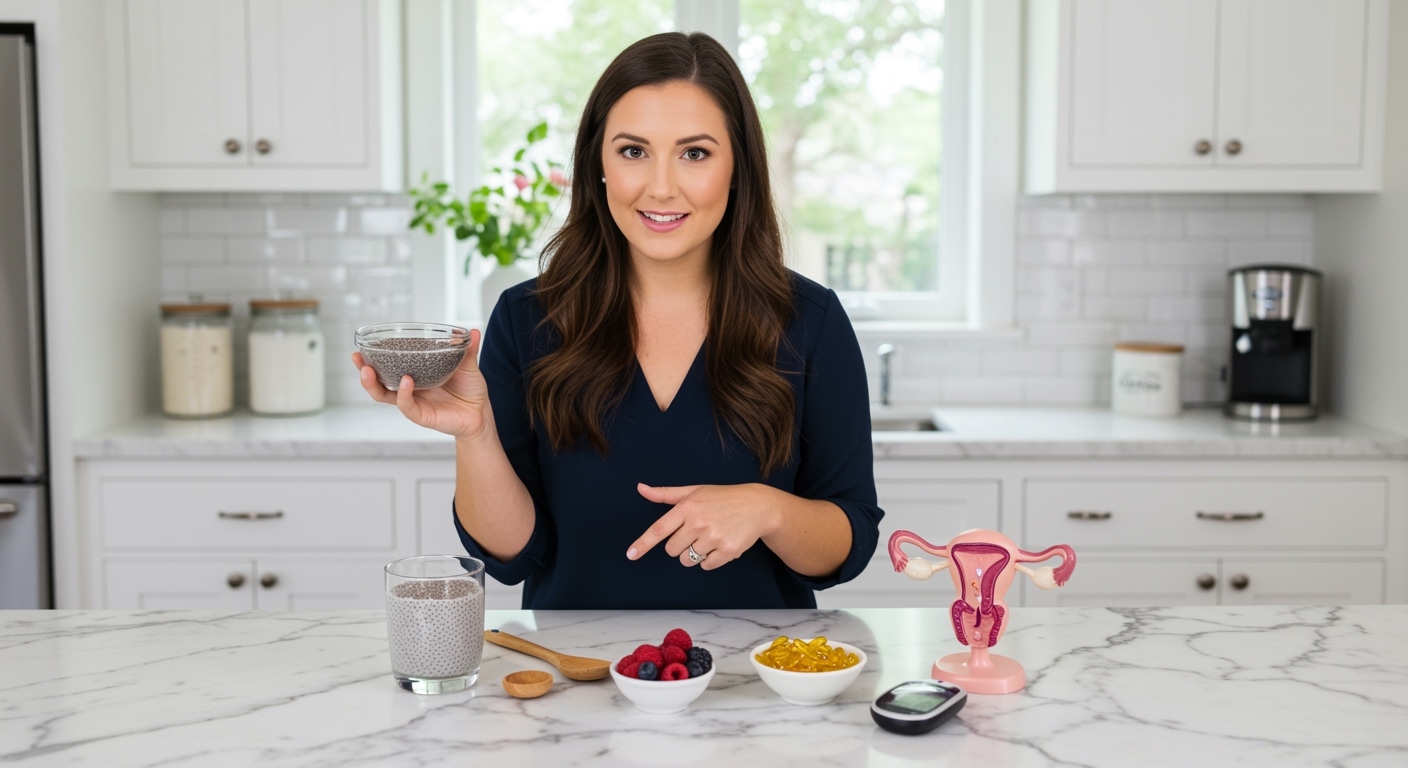✪ Key Takeaway: Chia seeds help PCOS by reducing inflammation, balancing blood sugar, and providing omega-3 fatty acids that support hormone regulation.
Introduction
You sprinkle them on yogurt and blend them in smoothies, but do these tiny seeds actually fight PCOS symptoms?
Many women with PCOS struggle with inflammation, insulin resistance, and hormonal chaos that makes weight management feel impossible.
Hi, I’m Abdur, your nutrition coach, and today I’m going to explain exactly how chia seeds can become your secret weapon against PCOS symptoms.
What Makes Chia Seeds Special For PCOS?
Chia seeds contain a unique combination of nutrients that directly target the root causes of PCOS symptoms.
These tiny powerhouses pack omega-3 fatty acids, fiber, protein, and antioxidants into every tablespoon.
The alpha-linolenic acid in chia seeds helps reduce chronic inflammation that drives many PCOS complications.
Research shows that women with PCOS have higher levels of inflammatory markers like C-reactive protein and interleukin-6.
Chia seeds provide soluble fiber that slows sugar absorption and prevents the blood sugar spikes that worsen insulin resistance.
The protein content helps stabilize blood sugar levels and keeps you feeling full longer, which supports healthy weight management.
✪ Fact: Just two tablespoons of chia seeds contain 10 grams of fiber and 4 grams of protein.
How Do Chia Seeds Fight Insulin Resistance?
Insulin resistance affects up to 70% of women with PCOS and creates a vicious cycle of weight gain and hormone imbalance.
When you eat chia seeds, they form a gel-like substance in your stomach that slows down carbohydrate digestion.
This slower digestion prevents the rapid blood sugar spikes that force your pancreas to pump out excess insulin.
Lower insulin levels mean your body can better access stored fat for energy instead of constantly storing more.
Studies show that adding fiber-rich foods like chia seeds to meals can reduce post-meal blood sugar by up to 20%.
The magnesium in chia seeds also plays a crucial role in insulin sensitivity and glucose metabolism.
Better insulin sensitivity means your cells respond more effectively to insulin signals, reducing the need for your body to produce excess amounts.
✪ Pro Tip: Soak chia seeds for 10 minutes before eating to maximize their blood sugar-stabilizing effects.
Can Chia Seeds Balance Your Hormones?
Hormonal imbalance is the hallmark of PCOS, with elevated androgens causing acne, hair loss, and irregular periods.
The omega-3 fatty acids in chia seeds help reduce the production of inflammatory compounds that can worsen hormonal chaos.
These healthy fats support the production of anti-inflammatory prostaglandins that help regulate menstrual cycles.
Chia seeds contain lignans, plant compounds that can help modulate estrogen levels in your body.
The fiber in chia seeds also supports hormone balance by helping your liver eliminate excess hormones through improved digestion.
Better insulin sensitivity from chia seed consumption indirectly improves hormone balance by reducing androgen production.
When insulin levels drop, your ovaries produce fewer male hormones, which can improve symptoms like excess hair growth and acne.
✪ Note: Hormone balance takes 3-6 months of consistent dietary changes to show noticeable improvements.
What Is The Best Way To Eat Chia Seeds For PCOS?
The way you prepare and consume chia seeds can dramatically impact their effectiveness for PCOS management.
Start with one tablespoon daily and gradually increase to two tablespoons to avoid digestive discomfort.
Always soak chia seeds in water or liquid for at least 10 minutes before eating to activate their gel-forming properties.
Add them to protein-rich meals like Greek yogurt or smoothies to maximize blood sugar stability.
Avoid adding chia seeds to high-sugar foods, as this can counteract their blood sugar-balancing benefits.
The best times to eat chia seeds are with breakfast or as a pre-meal snack to slow down subsequent sugar absorption.
Drink plenty of water when consuming chia seeds, as they absorb up to 12 times their weight in liquid.
✪ Pro Tip: Make chia pudding the night before by mixing seeds with unsweetened almond milk for an easy PCOS-friendly breakfast.
Are There Any Side Effects Or Precautions?
While chia seeds are generally safe, some women may experience digestive issues when starting out.
The high fiber content can cause bloating, gas, or stomach discomfort if you increase intake too quickly.
Always drink adequate water with chia seeds to prevent them from expanding in your throat or esophagus.
Women taking blood-thinning medications should consult their doctor before adding large amounts of chia seeds to their diet.
The omega-3 fatty acids in chia seeds can have mild blood-thinning effects when consumed in large quantities.
If you have a history of kidney stones, limit chia seed intake as they contain oxalates that can contribute to stone formation.
Stop eating chia seeds and consult a healthcare provider if you experience persistent digestive issues or allergic reactions.
✪ Note: Pregnant women with PCOS should discuss chia seed consumption with their healthcare provider first.
The Bottom Line
Chia seeds offer real benefits for women with PCOS through their unique combination of fiber, omega-3 fatty acids, and protein that target inflammation, insulin resistance, and hormone imbalance.
Small seeds can create big changes when you use them consistently and correctly.
I would love to hear about your experience with chia seeds for PCOS management, so please share your questions, success stories, or concerns in the comments below.
References
At NutritionCrown, we use quality and credible sources to ensure our content is accurate and trustworthy. Below are the sources referenced in writing this article:
- PMC: Chia Seeds for PCOS Research
- Klarity Health: Chia Seeds for PCOS
- The Wellness Corner: Chia Seeds for PCOS
- PMC: PCOS Inflammation Research





